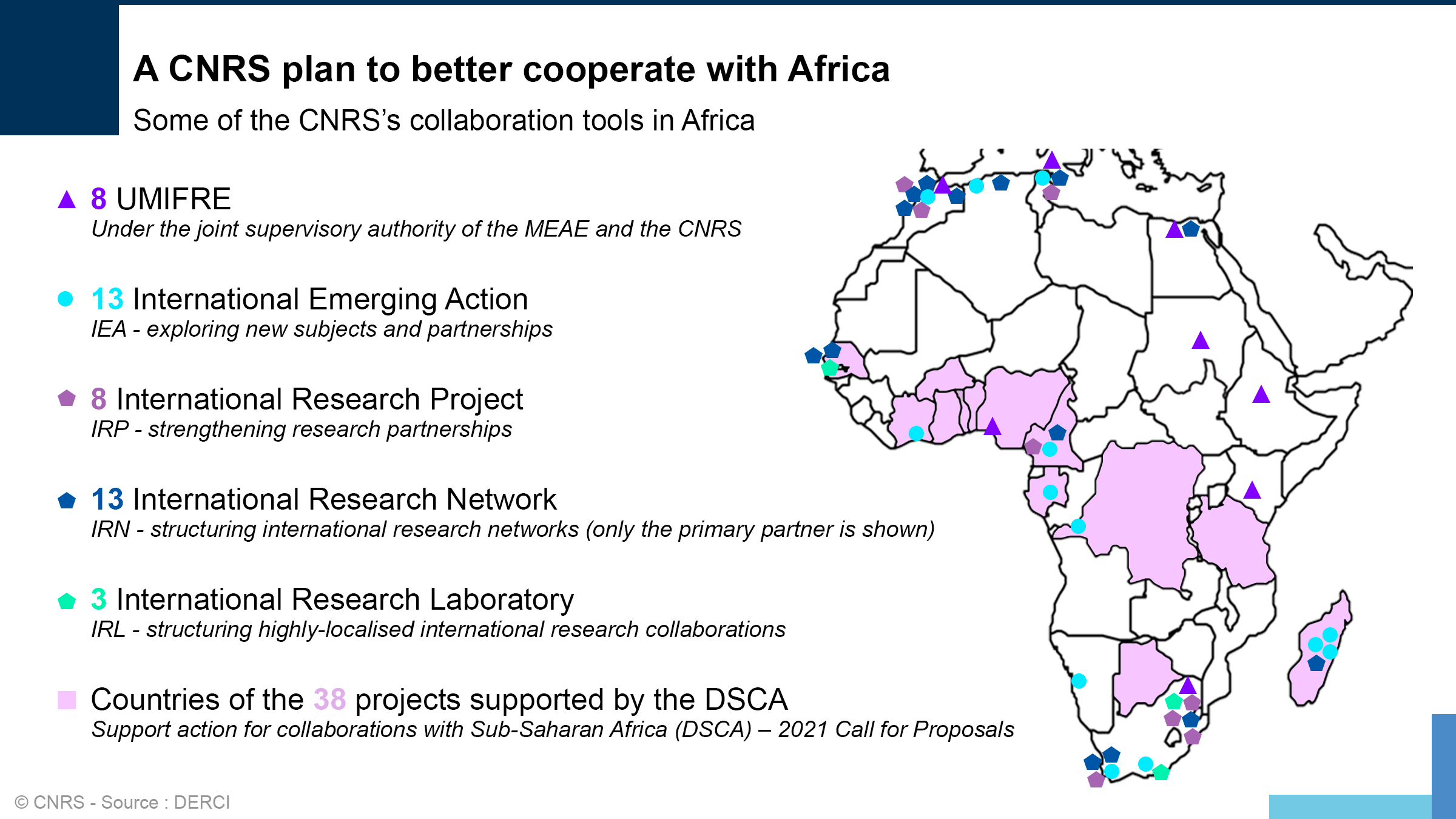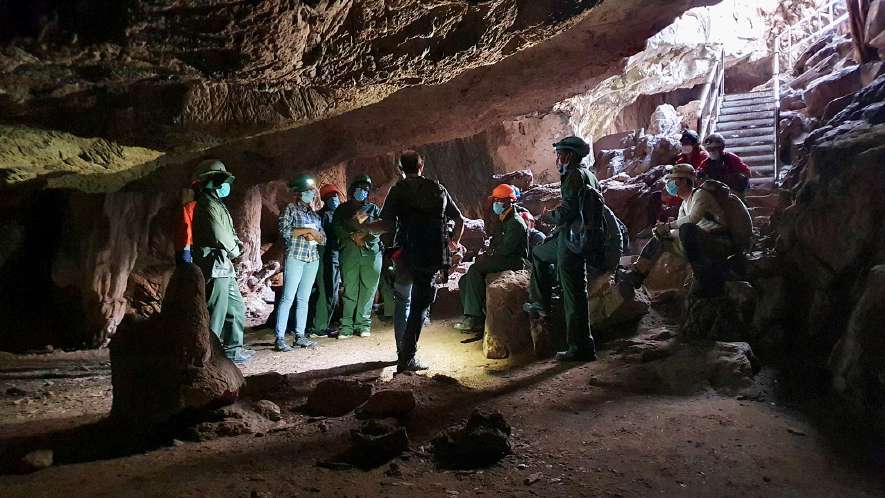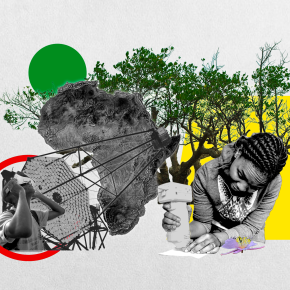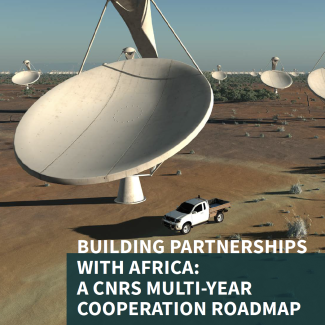The CNRS and Africa: A Co-constructed and Lasting Strategy
With its Multi-year Cooperation Plan with Africa, the CNRS aims to strengthen and expand its collaboration with countries on the continent, as part of a concerted and mutually enriching process.
The CNRS's first Multi-year Cooperation Plan with Africa is a co-constructed effort to establish strong, lasting, and equitable relations. "Additional investment is needed to address the issues facing our societies. The CNRS and its African partners both firmly believe in the urgency of this concerted process," assures CNRS Chairman and CEO Antoine Petit.
The CNRS already encourages and supports substantial research activity in Africa, with nearly 50 active endeavours on the continent in 2021 (see graph). The organization also has a network of French research institutes abroad (UMIFRE1 ) dedicated to the Humanities and social sciences and stretching across 8 countries, as well as a Regional Office for Southern Africa located in South Africa that is a central element in cooperation efforts with highly dynamic academic actors (see text box). Institutional cooperation efforts are concentrated in French-speaking countries, such as those in the Maghreb and West Africa, in addition to South Africa.

However, French scientific communities have less of a presence in Sub-Saharan Africa and East Africa, especially when it comes to institutional collaboration. The primary countries that publish in this region (Nigeria, Ghana, Kenya, Uganda) are English-speaking, and rarely work with France.
Following a first call for proposals in 2021, which drew the attention of CNRS scientists and helped map out interests shared by the organisation and Africa, the strategy seeks to address this lack of institutional cooperation, all while strengthening the joint projects already in progress. "We are committed to opening up to the whole of Africa, to all countries and all research disciplines," affirms CNRS Chief Research Officer Alain Schuhl.
A differentiated strategy constructed with African institutions and scientists
In order to take into account the diversity of situations, the strategy will be differentiated according to geographical area. The countries of North Africa are some of the CNRS's closest Euro-Mediterranean partners, and priority will therefore be given to strengthening existing collaborations – such as institutional arrangements, mobility, training doctoral students, etc. – and to increasing joint scientific productions.
- 1Under the joint supervisory authority of the French Ministry for Europe and Foreign Affairs (MEAE) and the CNRS.
CNRS institutional representation in Africa
The CNRS Office in South Africa, which was created in 1995, is a shared effort involving the IRD (since 2011) and CIRAD (since 2015). It is based at the Innovation Hub in Pretoria, in close proximity to South African research and funding partners, and helps African and French scientists structure their collaborations and develop long-term cooperation strategies. "South Africa shares some of the objectives of the CNRS's multi-year plan, especially developing international and Pan-African connections," believes Jean-Pascal Torreton, the regional representative for the joint office. "To build fruitful and lasting relations, it is important to be consistently present and to better understand the scientific environment." Given the diversity of African countries and the "indisputable" added value of an office present in the field, the CNRS plans, in the near-term, to establish another office to represent it on the continent.
With the internationally recognized quality of its scientific production, as well as its already strong ties to the CNRS, South Africa has a "privileged and special" role, points out the Director of the CNRS's Europe of Research and International Cooperation Department (DERCI), Christelle Roy, who oversaw the creation of the multi-year plan. The objective is to reinforce existing cooperation in physics and chemistry, space sciences, ecology and the environment, biology, and mathematics. A strategic partnership was initiated in 2019 with the University of Witwatersrand, the highest-ranked African university, through a joint PhD program that allows doctoral students to conduct research in both South Africa and France. In addition, a framework agreement grants CNRS researchers an "associate researcher" status during their stay. "This partnership gives the CNRS greater visibility and broader influence within the University of Witwatersrand's African and international network. It provides a clearer picture of potential cooperation, especially in West Africa." Similar programs could emerge with other partners of excellence on the continent, in order to reinforce the CNRS's participation in training students and staff, as well as to foster greater mobility and exchange.
Finally, in Sub-Saharan Africa, "we wish to initiate, strengthen, and renew our approaches in the field, in an effort to foster balanced partnerships." Collaboration should be founded on "genuine co-construction " to define the needs in terms of training, research, and innovation. It will rely on combined regional approaches, in an effort to adopt the strategy initiated by the African Union (AU), which promotes synergies between countries that share borders.
As with all international cooperation, openness and transparency – notably with regard to intellectual property and data protection – will be indispensable. The strategy was thereby presented at the Science Forum South Africa in December 2021, to gather potential advice and comments.
Diverse disciplines responding to current and future challenges
"The institutional recognition and financial support of the CNRS has allowed us to develop genuine, rich, and interdisciplinary exchange with our colleagues in Botswana, beginning with our very first cooperation," attests Laurent Bruxelles, a geomorphologist at the TRACES2 laboratory, whose submission was selected during the 2021 call for proposals. His research focuses on human origins, and the search for new pieces of the cradle of humankind in Africa. This archaeological and patrimonial research is of interest to the Botswanan government, especially in its effort to develop cultural tourism. The team, which consists of 8 people from France and 19 from Botswana, launched a project with the Botswana National Museum involving archaeological prospection and mutual training. The CNRS's development of a cooperation plan with Africa is thus "a sign of confidence, one that allows us to establish these relations, which are so essential to our work, in a lasting manner."

The multi-year plan seeks to take full advantage of these fruitful cooperation, in terms of the diverse countries involved as well as the range of scientific fields explored. The subjects will cover various disciplinary fields, ranging from frontier research to concrete application, but also highly interdisciplinary efforts connected to the challenges being tackled by African countries, such as immunology, water, and agriculture. These issues echo the six major societal challenges3 identified as priorities in the 2019-2023 Performance and Objectives Contract concluded between the CNRS and the French government, as well as the Sustainable Development Goals4 announced by the United Nations in its 2030 Agenda, or those of the African Union’s Agenda 2063. Innovation will not be forgotten, with the creation of joint research structures with companies and the funding of research that could potentially lead to the creation of start-ups. "The complexity of the research issues, and the need to engage with them via diverse, systematic, and interdisciplinary approaches, make the CNRS a leading partner," ensures Alain Schuhl.
A European framework
The CNRS has pursued a concerted approach. The strategy has been the subject of discussions with its research partners—with institutions for higher education, research, and innovation already highly involved in Africa, such as the IRD, CIRAD5—as well as with universities and the French Academy of Sciences. The discussions will also be continued with the French National Research Agency, the relevant ministries, the network of Scientific and Academic Cooperation Attaches (ACSU) of French embassies, as well as with social and economic partners.
"We have a policy of co-construction with the CNRS," confirms Jeanick Brisswalter, President of l'Université Côte d'Azur. As part of its excellence initiative (Idex), the university implemented an "international action toward the South,” especially for areas of shared interest with the CNRS in English-speaking Sub-Saharan and Central Africa. The objective is to build a research hub with the IRD on subjects such as migratory studies, archaeology, astrophysical observations, and mathematics, initially in Kenya and expanding from there. The CNRS and l'Université Côte d'Azur will bring together their respective tools to further their international strategy, and to especially increase inbound and outbound mobility in these regions. "Working with African countries has enabled us to expand our working subjects, and to take advantage of high-level scientists in these new areas. In return, we hope to enhance the skills of those African partners who wish to do so, with a view to increasing their potential."
- 2Travaux et recherches archéologiques sur les cultures, les espaces et les sociétés (CNRS/Ministère de la Culture/Université Toulouse - Jean Jaurès).
- 3Climate change, educational inequality, artificial intelligence, health and environment, territories of the future, energy transition.
- 4The Sustainable Development Goals (SDGs) address challenges relating to poverty, inequality, climate, environmental degradation, prosperity, peace, and justice.
Two unions in conversation
The European Union (EU) and the African Union (AU) have strengthened their collaboration. In 2020, the EU identified five key domains in its "comprehensive strategy with Africa": green transition, digital transformation, sustainable growth and jobs, peace and governance, migration and mobility. The Horizon Europe framework program (2021-2027) targets 36 subjects, and has a budget of approximately 350 million euros, making it especially relevant for cooperation with Africa. The preceding framework program, Horizon 2020, financed 474 projects on the African continent, including 34 involving the CNRS. The European pilot programme entitled "African Research Initiative for Scientific Excellence" (ARISE) was also launched in late 2020: implemented by the African Academy of Sciences (AAS), it allows African scientists early in their career to conduct cutting-edge research throughout Africa, and fosters research in various fields of scientific activity, with a focus on the EU's and AU's shared priorities. As part of the French presidency of the EU, a European Union-African Union summit was held in Brussels on February 17-18, 2022.
"Europe has a role to play in developing collaboration between France and AU member states," explains Christelle Roy, who recognizes the "Horizon Europe framework programme's openness toward the international scene and Africa in particular (see text box), which matches the interdisciplinary vision of the CNRS." The multi-year plan was thus also conceived in synergy with the CNRS's European partners, especially research organizations belonging to the G66 network, with European funding potentially providing opportunities to implement structured projects in Africa.
An Africa-CNRS Advisory Board was recently created to establish this in-depth scientific and strategic dialogue. Reporting directly to CNRS management, it is made up of important French and African figures, including Yvonne Mburu, founder of the Nexakili network for African and African diaspora health professionals, scientists, and engineers. "I will make sure that the cooperation plan becomes part of the existing ecosystem, so as not to heighten competition between countries," she promises. She believes that the CNRS should be a "guide," such that African universities and networks on both the national and AU level "marshal their complementary skills and take advantage of French expertise and know-how," notably in terms of training and market development. “This is a historic moment for rethinking how international actors intervene in Africa, and for decolonizing science, especially public health, by leaving behind the logic of foreign interest. Research must firstly be useful for local communities, where research is conducted and where local knowledge and expertise in the field is developed. We all share the same planet: like other countries, France will benefit from strengthening scientific research in Africa and funding African priorities, as the world will be better understood and healthier."
Through its knowledge of science-related issues in Africa and Pan-African scientific networks, this advisory board will help construct the long-term plan by stimulating reflection on which forms of cooperation to favour, on what the topics of interest are for the various parties, as well as on the emerging collaborations that should be strengthened. The strategy will therefore be reworked and refined as needed over time, in accordance with the scientific evolution of projects and their impact, or with the evolving shared ambitions of partners, "as part of our permanent efforts to do better together," concludes Antoine Petit.
- 6The G6 network includes the primary European interdisciplinary research organizations in Germany (Helmholtz Association, Leibniz Association, and Max Planck Society), Spain (CSIC), France (CNRS), and Italy (CNR), with over 135,000 collaborators.
Africa, a partner for the future
"Providing renewed impetus to our engagement with African partners is a CNRS priority," Antoine Petit assures. Research actors on the African continent, who today represent 2.4% of scientists globally, still have low scientific production, due especially to a lack of equipment and resources. However, they have shown rapid growth over the last decade, with a high number of international copublications.
With the Agenda 20637 , most African heads of state committed to invest greater resources for developing science and technology – a driver of growth – through education, research, and innovation. In addition, numerous initiatives are pursuing a Pan-African vision, with networks of excellence such as the Pan-African University or the African Institute for Mathematical Sciences, although each country also has its own specific features and priorities. Numerous initiatives are also being pursued by foreign policies, such as the "Merkel Plan," which has proposed a multi-year investment plan for Africa, or the Africa-France New Summit held in Montpellier in late 2021.
The continent's countries are therefore assuming an increasingly important role on the international stage, for instance with South Africa hosting the World Science Forum in December 2022 on the topic of "science for social justice."
- 7The AU's Agenda 2063 was adopted in 2015, and seeks to transform Africa into a future global power.




